A year of mentoring with Experiential Learning

Dr. Rahul Garg, a Professor in the Department of Computer Science & Engineering, IIT Delhi, joined The Peepal Grove School on a sabbatical in 2022-23 to lead Experiential Learning at our school. Dr.Garg holds a B.Tech and a Ph.D in Computer Science from IIT Delhi and a Masters from the University of California, Berkeley. His fields are data science, machine learning and brain imaging.
In the past year that he has spent at The Peepal Grove School, Dr. Garg has been taking the children across different grades through an uncharted journey of learning.
His arrival at The Peepal Grove School happened as a culmination of a series of circumstances starting with his heading the Department of Value Education at IIT Delhi. As he prepared the curriculum, he happened to meet several accomplished thinkers, educationists and spiritual masters including Sri M. This led to Sri M being appointed as Adjunct Professor of Practice (APoP) in the Department of NRCVEE – National Research Centre for Value Education in Engineering at IIT, Delhi, where he conducted a series of online courses for the students of IIT-Delhi on various aspects of Indian thought and philosophy.
“As the Head of the National Resource Centre for Value Education in Engineering, I felt the need to explore a wide variety of pedagogical approaches, especially with respect to Value Education. The Peepal Grove School seemed like an interesting choice to explore further”, says Dr. Rahul Garg.
One of his first projects at The Peepal Grove School was exploring and discovering the virtues of millets with the students of Grade 7. This exercise and exploration on millets connected them to diabetes and water scarcity. As part of the project, students learnt to cook millet recipes, visited paddy and millet fields in the neighbourhood and compared the quantum of water consumption between paddy & millets. They concluded their project findings with a play on the human body’s fight against diabetes using allies like millets, dance and exercise.
In the 2nd term, the students of Grade 7 observed the Panchayati Raj system in surrounding villages with Dr. Garg.
Wearing his scientist hat, Dr. Garg is working with the students of Grades 6, 7 & 8 on a variety of fascinating science projects such as making plant pigments, a simple ECG machine, studying the effects of Pranayama on heart rate and blood pressure, detection of adulteration of milk, installing a weather station, identifying blood groups, composting, building a herb garden and so on.
Says Dr. Garg, “The Peepal Grove School is located in a beautiful and secluded valley with modern facilities that makes our living experience a treat. The children are very loving and enthusiastic. Exposure to new ways of doing things is encouraged. In addition, regular workshops for teachers that the school organises on a regular basis has been a great learning experience for me”.
He has also started an Electronics and Robotics club for the students. The students are currently working on making their own robots under his guidance. “It is easy. It is all about putting together the right algorithm and some basic equipment”, he says. Dr. Garg also started the “Brain Exploration” club. Every weekend, students read literature, watch videos and discuss fascinating dimensions of the human brain.
As Dr. Garg’s sabbatical comes to a close next week, he leaves the school with fond memories. “At The Peepal Grove School, I was exposed to a different philosophy of learning and teaching which was so new to me. Unlike the conventional education system that thrives on rewards and punishment, the philosophy at The Peepal Grove School is to offer an environment to the students that is free from external rewards and punishments. Such an environment is absolutely essential for learning”, says Dr. Garg.
He leaves us all enriched with the treasures of hands-on experiences that will be cherished by us for a long time.
In the Kalari Pit
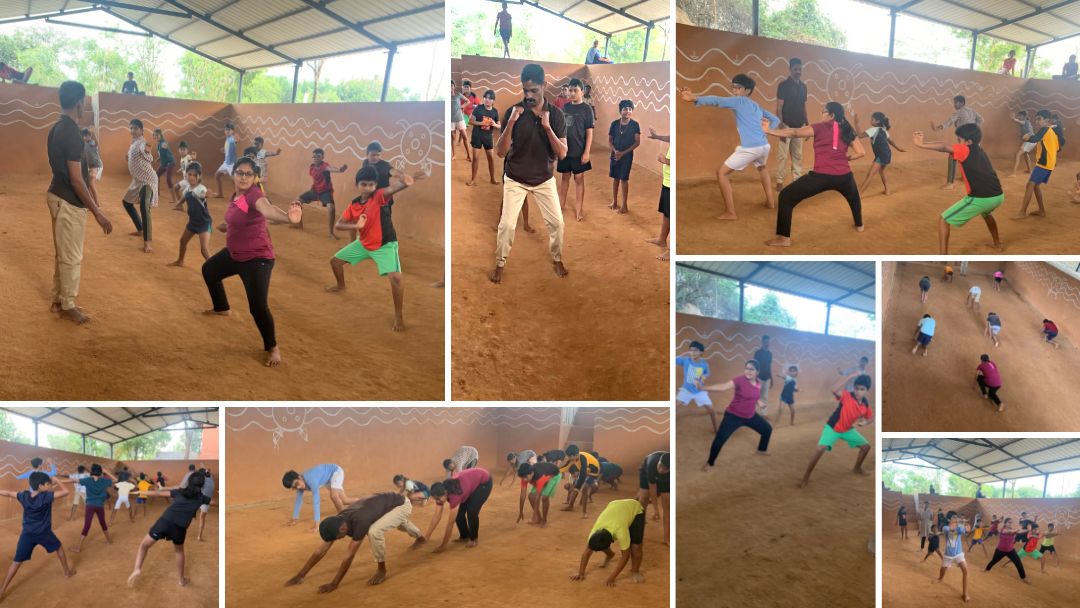
A tiny lamp blinked at the far end of the kalari pit of The Peepal Grove School. The speck of fire seemed to be watching quietly as the boys and girls of Grades IV and V synchronised their limbs and bodies with their kalari teacher.
When they faltered, Rajesh, the kalari teacher, would hold a foot and effortlessly manoeuvre to reach a palm that would then hold the foot and end in a graceful statuesque position. Others copy the move. ``Bhaiyya, you make it look so easy,” ’a boy cries with amazement. ``Bhaiyya, how long have you been practicing?’’ another student asks, trying to balance on a leg. ``How old are you?’’ the yoga teacher who is assisting Rajesh asks. Ten, says the boy. ``More than that,’’ says the teacher. ``That’s more than my life’’ the boy says as the two teachers smile.
This is the only school where Kalaripayattuis taught in a traditional kalari pit, says Rajesh. The pit is 42 feet long and 6 feet deep. At that depth, the temperature stays stable. That is the depth beyond earthly existence, life and death. It’s a level where nobody has ever been cremated, Rajesh explains.
The twinkling flame in the pit reminds Rajesh of the first time he, as an eight-year-old lad, had learnt these kalari moves under his teacher at a kalari in his hometown of Badakara in Kerala.
The flame has been passed on from centuries when folk warrior heroes of Kerala perfected the art of Kalaripayattu. “Its principles are derived from the scriptures”, says Rajesh who has now been teaching students at The Peepal Grove School for over 12 years.
About 50 children learn under him and practice till he arrives the next week.
There is a sudden gust of excitement and students chat excitedly. The yoga teacher assisting Rajesh had left to get sticks. Sticks. That was the reason for the excitement. Soon the sticks arrive and the students want to try their hands at swirling the stick with each hand.
Rajesh is reminded of a student who picked up the stick manoeuvre very fast and began using two sticks at the same time in both hands. The student was passionate about it and wanted to move on to the next stage of whatever she was doing. She practiced so hard that she was able to master it. Kalari demands that kind of spirit.
Rajesh also teaches Kalaripayattu at a few schools in Kerala as a self defence art. It is only The Peepal Grove School (among all the schools in the country that offer this traditional martial art) that has a kalari – the name for a traditional kalari school.
He calls Kalaripayattu the mother of all martial arts and says that it spread to China and the Far East through Bodhidharma, a Buddhist saint who is said to have lived more than a 1,000 years ago in southern India.
Kungfu and Karate represent the fourth stage of kalaripayattu, he says. The martial art form has basically four parts. The first stage focuses on gaining control over the body through ``meyvazhakkam’’. The second stage is ``kolthari’’ or use of wooden weapons. The third stage is mastering the use of metallic weapons and the fourth one is unarmed combat. Students at The Peepal Grove School are taught a bit of all four and it gives them confidence and the skill of self defence.
A new batch of older boys and girls enter the kalari pit and the younger ones reluctantly surrender their sticks and leave. ``Tomorrow you can do sticks early in the morning’’, Rajesh assures the departing students.
Practice. That is the only thing that can help them master kalaripayattu. The rewards cannot be measured. It's more than self defence and confidence. But for that, they need to practice nityabhyasianayeyumedukkum, he explains (the one who practices regularly can even lift an elephant! ). ``You have to practice till I return next week,’’ he tells his last class that Sunday.
It's afternoon and it's time for Rajesh to leave for his home in Badakara. Rajesh bids goodbye to his students and promises to do kolthari(stick manoeuvres) the following week. ``But, practice,’’ he reminds the children again.
Sreelatha Menon, Faculty @The Peepal Grove School
Fail the method, not the child

It was John Holt who famously said, fail the method, not the child, back in the 1970s. However, this seems so difficult in practice. When we say ‘fail’ it doesn’t necessarily mean a failure at an examination or at the end of an academic year. Often one finds that a child who has a lot of potential doesn’t show the zeal to actualize it. Then there are students who don’t finish their assignments on time or give in incomplete work. You also have students who are weak and no matter how much you goad them, do not show much improvement. At such times the teacher is apt to get frustrated that despite her sincere efforts, the child seems disinclined to cooperate.
Often the teacher blames the child or even their backgrounds for their poor attitude’. This mostly leads to a battle of wits between the teacher and student resulting in escalating tensions.
This is where it is important for educators to mull over what John Holt said. In a study done, it was found that only 20% of teachers in France adjust their methods to individual ability, compared to 65% of those in Norway. (Economist, September 30th, 2017). This shows that in some countries there is recognition of the importance of using different methods and strategies with different students in class. This requires a teacher to be sensitive to the needs of each student in the class, the belief that there is a solution to the difficulties the child is facing and fortitude and dynamism to try out varied strategies.
How often have we experienced such a teacher in our school or college life? If indeed 65% of teachers in Norway have learnt to adjust their methods to individual ability, then there is hope that one day our school heads will also expect this of their teachers and accordingly train and orient them. That will indeed lead to a revolution in our education system.
Viraj Naidoo, Academician.
Academic Co-ordinator @ The Peepal Grove School, an alternative school in India Reach out to him on LinkedIn https://www.linkedin.com/pulse/fail-method-child-viraj-naidoo/
A Gift And Memories

Each student here at The Peepal Grove School, an alternative boarding school in India, when they leave, will carry back with them a gift- something they have either learnt or improved upon, during their stay here. For me, that gift will be music. In many ways, this alternative boarding school in india has proved to be, at least for me, an experience that has greatly helped me expand my horizons in so many areas. In the area of music, however, it was more than an expansion. It was an explosion.
It is difficult to explain the lure of music. It has an intangible addictive quality to it- enticing you without your knowledge, and only once you’re completely drawn in, do you realize the intensity with which those soul-stirring melodies have affected you.
So, too, it was for me. It started as far as I remember, as an innocent-enough session of singing whatever the latest songs were, in the alternative boarding school , every Saturday and Sunday evening. As time went, I discovered a couple of other girls who seemed to be interested in the same kind of music as I was; and from there it took off.
One of us happened to be an instrumentalist- she played the keyboard. She also happened to possess a flair for notes- the musical kind. Coincidentally, the other happened to have a voice beautiful enough to bring life to the tunes we churned out. And me? I just went on doing what I did best- waxing lyrical!
What helps about the atmosphere of Peepal Grove is this freedom that is given to you to explore. We’re encouraged to question stereotypes and barriers. And so we did.
Focused on variety, on being different, and inspired by the love for what we were doing, we each used our own special gift to create something we would hold close to our hearts for the rest of our lives. Three strands, three vivid colors, intertwined together to form one brilliant braid. And as the braid grew longer and stronger, so did our friendship.
The Peepal Grove school proved the setting where I found one of the greatest loves of my life. Peepal Grove provided the atmosphere and encouragement required for this love to grow into a full-blown passion, a considerably healthy addiction. And Peepal Grove also provided me with two of the closest friends I could have ever found- partners in practice, with whom I shared the simple, yet priceless joys that music brings.
My legacy from alternative boarding schools in india – music. And along with it, memories and friendships to bring me happiness for the rest of my life, wherever I go and however long I live.
– Sreelakshmi (2010 student at The Peepal Grove School, an alternative residential school in India)
A Question On Reality

Many times in life, when we are neck deep in dilemma and do not know what to do, we often hear ourselves saying “I just want to do the right thing”. Here, a fundamental question on and for humanity arises. What is right?
In a classroom, recently, I was unfortunate enough to witness a small but bitter quarrel between a few dear ones. When it came to judging who I thought was right, I was at sea. Knowing the people on both sides of the quarrel fairly well, I realized that in their own ways, they were both right. Both had their own ideals, their own opinions and they were both faultless.
Then the question arises: if two rights fight to prove each other wrong, what does the result turn out to be? What is finally right? What is the truth? “To each his own” is a favorite axiom of mine. However, I’ve found it incredibly challenging to follow. To me, what I believe is my truth.
For whatever reason, another person might differ from me. Nevertheless, both the truths are true. It is our very own truth and it makes us who we are and makes us do what we do. To a jihadi terrorist and a Tibetan monk, the truths are very different. But to them, it is their truth and it moulds their life.
At an individual level, we all have a truth (or something we would like to call our truth). But in the larger canvas of life, which truth must we believe in? Which truth is the right truth? Is there a right truth as such?
Here is a question to the whole of humankind. Before we ask the human kind as a whole, why not begin with our own minds?
– Gauri Kashyap (2012, student of The Peepal Grove School, an alternative residential school in India)
For A World Of Colours
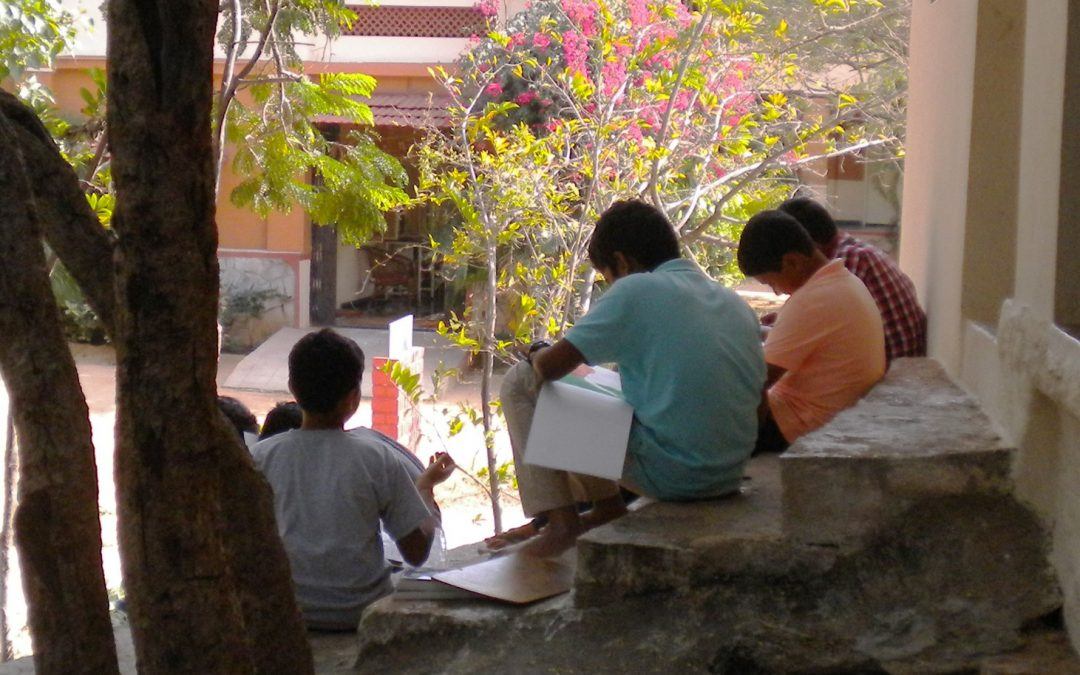
Any minute of my life, I would love to escape into a world of colours where structures aren’t the predominant factors and it is colours that matter. A world where nothing else is known, but the bliss of enjoying the blending of different colours that results in the formation of a new, spectacular beauty.
The air is colourful and shimmering. People speak and express themselves in terms of colour. Anything dull that hasn’t absorbed the different shades and hues is confiscated. The very bodies of all animals are patches of different colours like the sky during sunset. All have an innate passion for art and hence the entire world is a masterpiece. All the seven billion people on earth, each unique, yet artistic, would make the world mind-blowing!
However, ultimately, such a world will crave and demand another world to escape into and hence numerous worlds will be created by our imagination.
So, the world I am in is probably the best. Though, at times, when I wish for another, I stick to the fact that escaping from this world is something I would regret. Fantasies are in their place and may they remain so. This world teaches us how to live.
– Samyukta (2013, student of The Peepal Grove School, an alternative residential school in India)
If I Believe
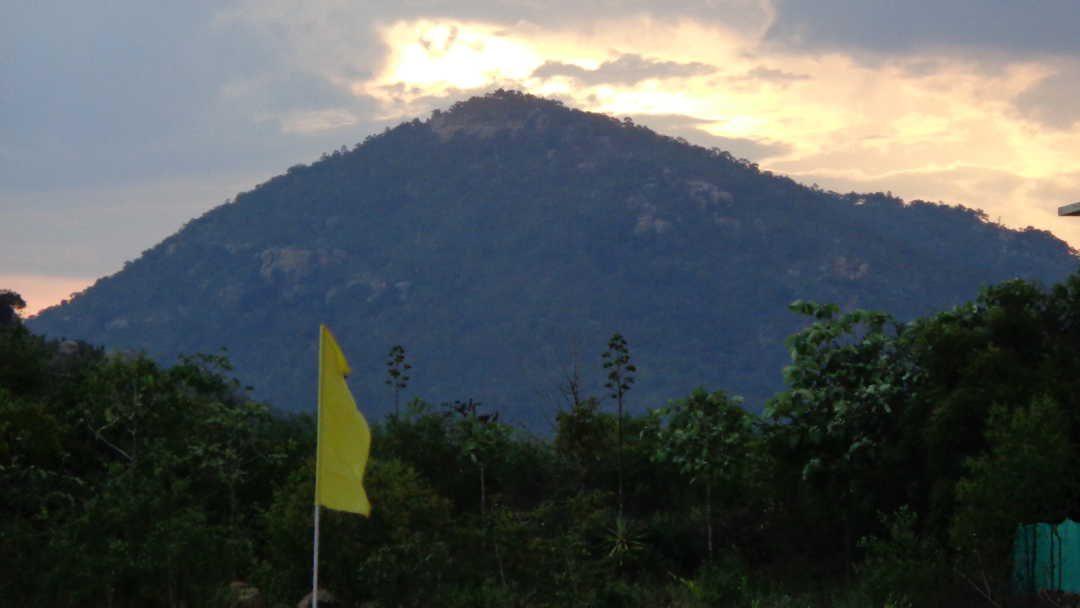
I’m not going to stop till I touch the skies,
I’m reaching for the stars, all set to fly.
Dreaming big each night and day,
If I believe, I can catch the sun rays.
The distance is long, the journey tough,
The hurdles many, and the hardships rough.
But I’ll cross the road blocks and go on my way,
If I believe, I can seize the day.
Words of spite and feelings of guilt,
I wade through many waters, hand on sword hilt.
The words of the world, may destroy my pride,
But if I believe, I will still ride.
Break through the barriers of the grey clouds,
Emerge a hero, hearing the cheering crowds.
Give the enemy a fight for his life,
If I believe, I can clear the strife.
Riding along a black horse of thunder,
Treading carefully the marshes, lest you might flounder.
Walk the honorable path and you will shine,
If I believe, which I do, victory will be mine.
– Sreelakshmi (2009, student of The Peepal Grove School, an alternative boarding school in India)
River Ganga | Saving India's Lifeline

Over the past few years, I have been deeply concerned at the monumental environmental threats faced by the Himalayas and, Ganga in particular. These two have remained our cultural icons since times immemorial. Despite its haloed status, it is today the world’s fifth most polluted river, endangering humans and the fauna endemic to it. The Ganga Dolphin and Indian Gharial, commonly found in the river, are on the verge of extinction.
During our padayatra, we came across rivers whose state is similar or more alarming than the Ganga. Everywhere, we found rivers reduced to a trickle, having graduated into dumping grounds for sewerage and industrial waste. While the Government has had various river cleanliness missions in place for the last 30 years, the pollution has grown manifold proving that all efforts in this direction have come to nought.
I believe that true sustainable living begins with compassion, and from compassion comes the ability to share responsibly. We all share the environment and it is only with our participation that steps can be taken to rectify the impending ecological doom. Through our initiatives, we inspire harmony with nature to energise our immediate eco-systems and reduce our personal footprints.
With its mystical connection, Ganga has become the consigning point for everything material. The sore truth is, at its most holy points along the 2525 km course, the river is also the sole recipient of the respective city’s sewerage, almost 13 billion litres every year. Add to this, millions of litres of industrial effluents generated by hundreds of factories, and the run-off from chemical fertilizers and pesticides from hectares of agricultural land served by the Ganga.
The condition of the Ganges is also a result of the religious significance attached to it. We consider the Ganga in a maternal context—terming it Ganga Maiya. Its rampant pollution is certainly a desecration of this sacrosanct sentiment. At some level, it is important to tone down our spiritual expectations from Mother Ganga, and instead focus on our natural duty to preserve this vital lifeline. A dedicated campaign preserving religious sensibilities while driving home a message of the river’s conservation is badly needed.
Legislation for safeguarding our rivers is also the need of the hour. Strict implementation of this will prevent effluent pollution by industries and diversions of water by vested interests. The youth of this country are key to this national mission. I foresee a dedicated, well-coordinated youth mission—a Ganga Corps—on the lines of the NCC, that will involve our youth to build a systematic awareness in the society, help monitor local effluent-generating agents and work on the ground in an organized manner to help clean the rivers. This will add considerable impetus to the efforts by the Government, deriving faster results.
Sri M (Founder of The Peepal Grove School, an alternative residential school in India)
What Children Need From Their Parents
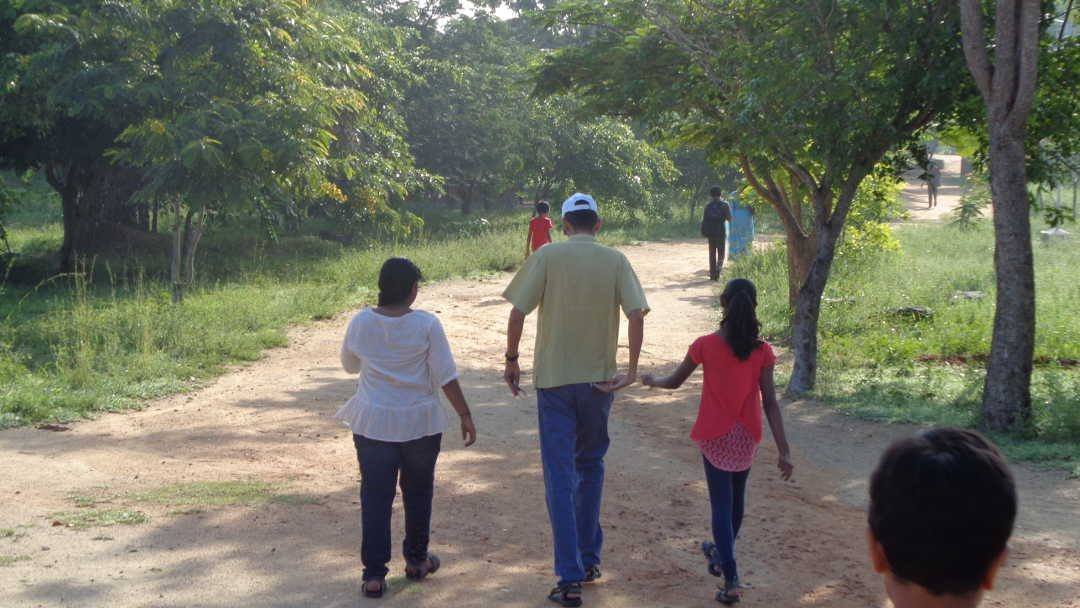
Most of the time, parents have some expectations about what their child should do or be. And it is assumed that it is the child’s job to reach his/her parents expectations and fulfil their ‘dreams’ about him/her. These expectations usually turn into rules and the parents’ job has become ensuring that the child follows these ‘rules’.
Usually, when children are born, their parents have ‘dreams’ about how their children are going to be. And they think that their children should fulfil their dreams. Hence, from the beginning of their children’s lives, usually parents try to mould their children’s minds in the way they want. However, it is said that it is for ‘their benefit’ (the children’s).
Parents should guide their children, but not try to limit their thinking. That will affect their independence and stunt their growth. It is natural that the parents have ‘desires’ on how the child should be but parents should not force their desires on the child.
Two important things which children definitely need from their parents is proper and constant guidance and the freedom to think, act and question.
Children definitely need guidance but parents should not limit their thinking and actions unnecessarily. Parents should not catch hold of their child’s minds in such a way that the child cannot even think freely. Parents have control over the child but they should not operate a child like they would a robot. If parents just want somebody who functions according t them, they should get a robot!
Parents think that if the child listens to them and does whatever they say, the child will be good and happy in life. But how then will the child learn to think independently?
Parents force their desires on their children and want to make them great because it will be a ‘very great achievement’ for them if they make their children successful.
If parents want their children to be ‘good’ and ‘civilized’ human beings, the children should be guided properly and constantly and they should be given the freedom to think and be encouraged to learn to think.
Some of the things which parents constantly worry about is whether their children can prove to be better than other children; whether they will become great, have name and fame, about their occupations, the way their children should think, whether they can get attention from others and much more.
Parents usually have some expectations from their children on most of the above aspects and in order to reach those expectations they themselves try to force these aspects on their children: give fame and name to their children, try to make others pay attention to their children. Because they want their children to stand out from the others, parents themselves try to ‘make a good life’ for their children and they do not give the space to their children to learn and live independently.
If you are parents, please think about giving your child freedom to think, question and act; and also proper and constant guidance. If you are the child, I think you have the right to ask your parents for your freedom along with their guidance.
Ganesh (2010, student of The Peepal Grove School, an alternative residential school in India)
A Crash Course In Numbers
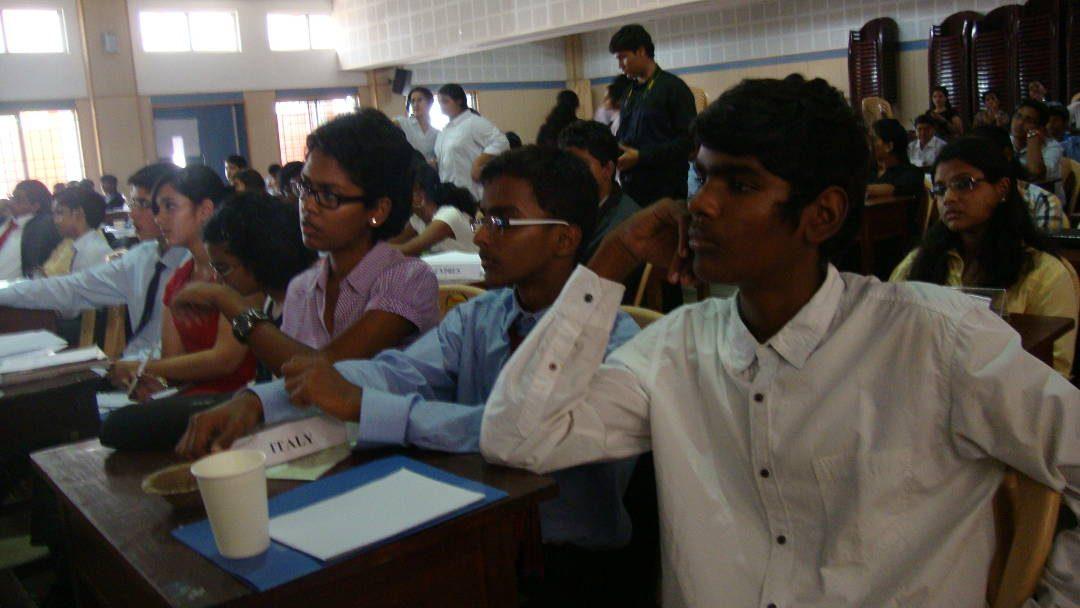
Mr. B. Sankararaman stayed at The Peepal Grove School for more than a week and provided the 12th graders of the school with a crash course in Math as well as helped build 3D math models with classes 6, 7 and 8.
On being asked about his experience in the alternative residential school he said “At a personal level my wife and I had a thoroughly enjoyable stay amidst caring and affectionate people. PGS is a beautiful place and it will continue to attract good and talented people all the time. I would love to keep coming back here.” The students greatly benefited from his visit and we hope to see him back time and again.
(B. Sankararaman is one of the most senior teachers at The Valley School, Bangalore. He was also the former Headmaster of the Senior Section at the school, these were his thoughts on this alternative residential school)
Maneka Gandhi's Visit to PGS ? An Alternative Boarding School
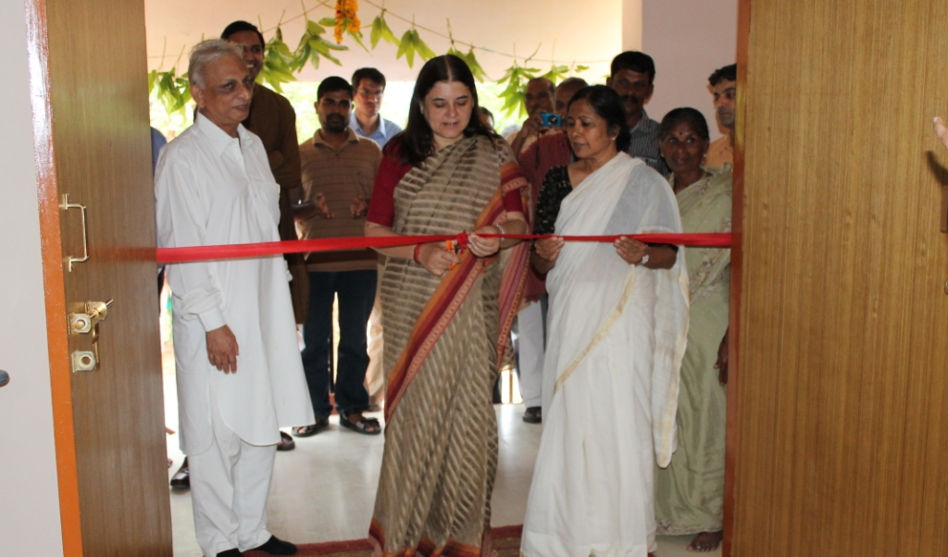
Smt. Maneka Gandhi, Member of Parliament and erstwhile Union Minister for Environment and Forests made a two day visit to The Peepal Grove School, an Alternative Boarding School in India on the 28th and 29th of September.
A student?s account of Maneka Gandhi?s interaction at PGS ? An Alternative Boarding School in India
She began her first interaction session with a story of how our heart lies in a butterfly. The significance of the role played by creatures that are considered undesirable such as mosquito, cockroach, hippopotamus and vulture were also stressed upon.
Maneka Gandhi's Visit - Peepal GroveHer interaction with us was dominated by stark facts and startling statistics which showed her genuine passion for all forms of life. Horrifying truths about the killing of the elephants in Kerala, poaching of tigers by shepherds and cultural and racial transformation due to the extinction of Dodos in Mauritius were exposed. A strong advocate of vegetarianism, she revealed that animals that are grown for meat need to be fed which implies that for every kilogram of meat we eat, we also consume eleven kilograms of plant food.
She also spoke about the nature of junk food and gave us all a shock when she said that a burger from McDonald?s if left untouched does not rot a bit for more than fourteen years! This tells us about the artificial ingredients that it contains. Her achievements in stopping cruelty toward bears by banning the usage of bears for street dance tricks and creating green parks to motivate villagers to keep their surroundings clean, among many others were fascinating.
The Infirmary at the Peepal Grove School inaugurated by Maneka GandhiAfter the interaction, Smt. Gandhi inaugurated the new infirmary in our Alternative Boarding School in India, campus, following which there was a Kalari demonstration by the students using sticks, swords, shields, spears, daggers and urumis along with bare hand fight techniques. Even after Smt. Maneka Gandhi left the school, the eco-fever lingers on the campus with the senior students surfing the internet for the longevity of burgers and juniors refusing milk as they hold their ground demanding details about the real nutrients in milk!
A personality with multiple identities ? environmentalist, animal welfare activist, ex-environment minister of India, wife of Late Shri. Sanjay Gandhi ? her visit provided the students and teachers an opportunity to learn and question many things.
Recent Posts
- Dancing to Teach December 2023
- Lessons in Losing and Winning 05-Oct- 23
- Chandrayaan-3: A Journey of Pride and Wonder 23-Aug-23
- A year of mentoring with Experiential Learning 03-April-23
- In the Kalari Pit 23-Jan-23
Copyright © 2023 THE PEEPAL GROVE SCHOOL All Rights Reserved.
